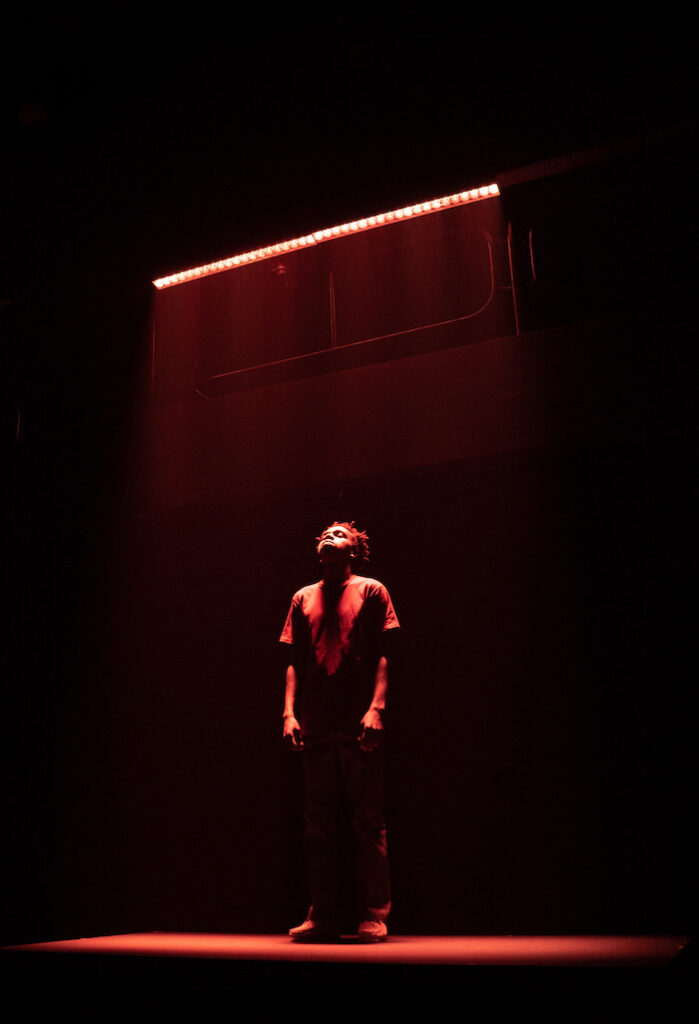JALI is a triumph of storytelling which, for Patrick Gunasekera, encapsulates the ebbs and flows of the migrant’s struggle to be heard and understood.
A single voice captures shared journey
18 February 2022
- Reading time • 6 minutesPerth Festival
More like this
- This Angel soars, even on one wing
- Power of language written on the walls
- Oh! What an extraordinary experience
JALI, Oliver Twist ·
State Theatre Centre of WA, Studio Underground, 16 February 2022 ·
Director, writer and performer Oliver Twist opens his solo show, JALI, standing still in contemplation. His presence is immediately engaging.
With focus and affection, he moves the audience effortlessly with him back to the fateful night he was conceived by his parents – a Hutu and Tutsi couple – on the eve of the 1994 Rwandan genocide.
Twist’s perspectives on his life and the people and places he’s shared it with unfold from here with an arrestingly tender certainty. He brings each scene to the stage beautifully as if reviving the pace, relationality and feeling of the first times he lived them.
Twist may speak with a single voice, but not a singular narrative.
His writing is crisp and finely detailed; sometimes delivered warmly like poetry, and sometimes punctuated by the self-assured comedic bounce fostered through his stand-up comedy practice.
Twist takes us from dream-like sequences in Rwanda’s Lake Kivu, to the lurid monotony of Brisbane Airport after a testing 30-hour voyage, back to a petrifying shophouse interrogation from Malawi militia earlier in life, and many more stories.
His performance moves generously and dexterously in this nonlinear back-and-forth across time and place, mirroring his own emotional breadth and evolving personality.
A one-person play poses a commanding challenge for any professional performer. But Twist carries this whole show with minimal support onstage, and never once loses his audience’s attention — demonstrating this young actor’s depth, commitment and talent.

JALI’s staging is a premier example of “simple but effective”. The black box Studio Underground is decked out with a plain raised stage, with large square areas subtly rising or submerging from its central level. With the show’s inventive and thoughtful blocking, the transition of each rich but fleeting scene lands carefully and perfectly.
The gentle but evocative backing tracks (Daniel Denholm) and proficiently placed LED light strips (Morgan Moroney, also credited for set design), effortlessly transport the audience through scenes from Twist’s life.
I attended opening night with my Mum, a Sinhala Sri Lankan migrant, and we resonated deeply with how JALI’s restless ebb and flow is grounded by Twist’s agency over his own thoughts and feelings.
From our perspective, the dramaturgy truly captures the migrant’s inner life and the unending circle of questioning and becoming, growing and grieving, losing and laughing. It’s a major achievement to stage so genuinely this slippery, ever-evolving essence we dance with inconspicuously beneath the vague label of “migrant and refugee Australians”.
When a person of colour defines authenticity for ourselves, we offer a quiet and affirming solidarity to each other in a world that doesn’t always permit us to be contradictory or self-determining.
For me, there is a familiar strength, strategy and tension in Twist’s uncompromising return of the white gaze through many stories in JALI. His incisive reflections are delivered outwardly, but seem to be spoken from an internal dialogue. It’s made clear the honesty of this dialogue is yet to be reciprocated by white people — and no artist of colour says this without first deeply negotiating the personal risk in doing so.
Twist’s vulnerability in these subversive acts pulses with an intense resolve and complex self-care. Witnessing this exchange between a young Black performer and an overwhelmingly white audience, I struggle to separate my viewing of Twist’s work from my own place as a person of colour in the arts.
How can we keep investing enormous energy into contemporary theatre, when this sector is so systemically alienating to us?
But Twist’s performance reminded me: for us, the main stage is a lifeline. It offers a direct and needed conversation with privilege we can’t lead in our everyday lives.
In a sector dominated by white perspectives, Twist did not make a show for the white gaze to consume.
Through an indispensable respect for his own voice, his presence in JALI is undeniably his own. And as the standing ovation on Wednesday night could attest, any audience can connect easily here with the space of strength Twist protects for himself.
Pictured top: Oliver Twist presents an authentic black migrant voice. Photo by Tom Gilligan.
For the latest news and reviews, subscribe to Seesaw’s fortnightly free e-magazine here.
Like what you're reading? Support Seesaw.





